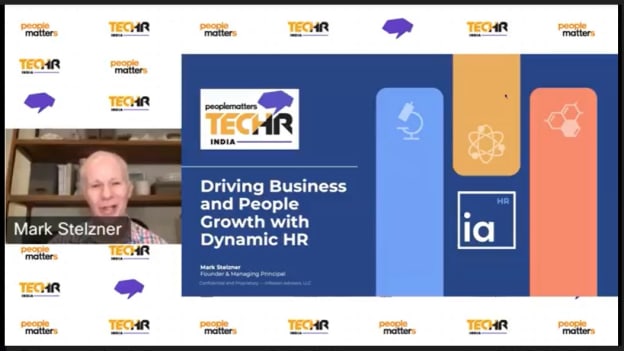“Everything is changing, so we need to change”

In many respects, for talent management leaders, the past two years have been the “perfect storm”. The transformation of our entire context - including cultural, economic and political factors - at a global level has tested the ability of HR leaders to respond with agility, vision and, above all, strategy.
At People Matters TechHR India 2022, Mark Stelzner, Managing Principal, IA HR, outlined some of these strategies that will allow HR professionals to make the leap from a transactional or operationally focused function to a value-based one. His keynote lecture, “Driving Business and People Growth with Dynamic HR”, expanded on the notion of Dynamic HR, bringing #FreshEyes to this concept and examining how best to navigate near constant change.
Mark has spent his career fostering relationships through attention to detail, natural curiosity, and a self-deprecating sense of humor. His more than 25 years of HR transformation experience have left him very clear about the success factors for the qualitative leap that the HR function urgently requires at a global level.
Are we overwhelmed by change?
The answer to this question is, for Mark, a good reason to embrace a new way of conducting HR management, based on identity, agility and scalability. As he pointed out, with the constant organizational, cultural, economic, and geopolitical demands, everyone needs HR's help more than ever. In fact, regardless of market, size or geography, the relentless pace of change demands agility, elasticity and constant challenge to the status quo.
Mark approaches this evolution (revolution?) in HR management from four perspectives:
- Catalysts for change
- Dynamic HR 101
- Start small, think big
- Ideate and Iterate
According to Mark, HR leaders are constantly facing a profound reprioritization of impacts and results, which forces us to think in a fundamentally new way of working, leading to a dynamic HR concept. “Some might argue whether this is an evolution, but in some of your organizations this may feel like a revolution,” he explained.
But although these are profound changes, it is not really a fresh start. “These are our expert functions around talent acquisition, talent management, rewards and a wide variety of other capabilities. These are folks that need to sit back, look at all of these conditions, look at what's coming and what's next. And think about both your cyclical and real time in the flow of work processes”, he said.
There is another basic starting point in redefining HR management as a strategic role: “What is our point of view, our policy, our technology, our capabilities, to thread these largely disassociated processes into something that is seamless, frictionless, dynamic, and engaging?" he asked
A multifunctional conception of the expertise of HR leaders is another of the new demands of the current context, which presents challenges such as the hybrid work model. To be precise, Mark spoke of cross functional expertise, where “the theory and the practice of what it means to be an HR professional” converge.
Furthermore, expertise doesn't necessarily mean experts outside the organization. “We can look across the organization within existing reporting lines, identify all those skill resources with various levels of maturity and organic effectiveness and organic design,” said Mark.
Start small, think big
Everything always begins with the first step, even the most profound transformations. This is also true for a successful HR strategy.
“We have to start small and think big; we have to ideate and iterate so we have to pick something you can ground yourself and something then you can then have success. Then advertise, iterate and improve.”
And even before that first step, there are a couple of questions to answer that will set the tone for the organization's change.
What is your vision? What are you trying to do? How do you find the experts? What do you think about Project governance? How do you kick the change off in a way that all have visibility of the value it could generate?
“Everything is changing, as we've discussed, so we need to change and be able to be fluid in the way in which we think about how we drive these types of outcomes.”
In closing, Mark called upon those in HR to have self-belief while remaining pragmatic.
“We as HR professionals also have to be realistic,” he said. “There's the art of the possible which we've discussed, and then there's the art of the probable. The art of the probable means that we as an HR function need to look in the mirror and look at each other, and provide the same level of care and support, rest and reflection that we advocate for our employees every single day. To do so requires rest, requires reflection, requires courage, and transparency.”















